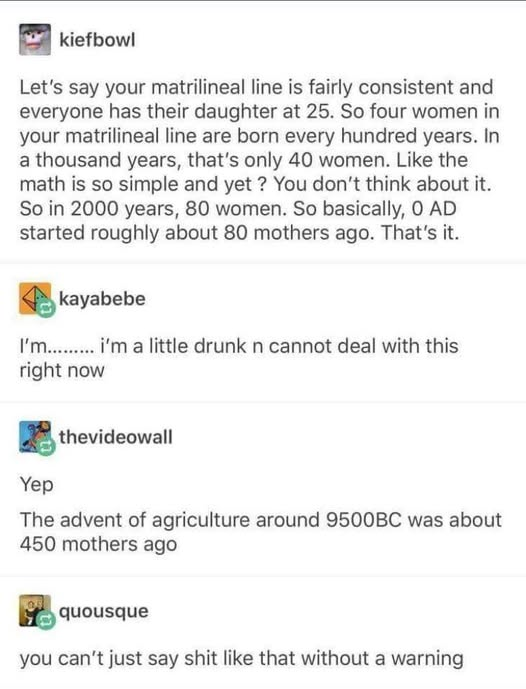That’s not a well-founded assumption. The average age of first birth was only 21 as recently as 1970. Go back a few hundred years and it’s way younger than that. Many women throughout history became mothers as soon as they were able (right after the onset of puberty). Many cultures had rites of passage into adulthood for boys and girls of that age. There was no such thing as adolescence.
Science Memes
Welcome to c/science_memes @ Mander.xyz!
A place for majestic STEMLORD peacocking, as well as memes about the realities of working in a lab.

Rules
- Don't throw mud. Behave like an intellectual and remember the human.
- Keep it rooted (on topic).
- No spam.
- Infographics welcome, get schooled.
This is a science community. We use the Dawkins definition of meme.
Research Committee
Other Mander Communities
Science and Research
Biology and Life Sciences
- !abiogenesis@mander.xyz
- !animal-behavior@mander.xyz
- !anthropology@mander.xyz
- !arachnology@mander.xyz
- !balconygardening@slrpnk.net
- !biodiversity@mander.xyz
- !biology@mander.xyz
- !biophysics@mander.xyz
- !botany@mander.xyz
- !ecology@mander.xyz
- !entomology@mander.xyz
- !fermentation@mander.xyz
- !herpetology@mander.xyz
- !houseplants@mander.xyz
- !medicine@mander.xyz
- !microscopy@mander.xyz
- !mycology@mander.xyz
- !nudibranchs@mander.xyz
- !nutrition@mander.xyz
- !palaeoecology@mander.xyz
- !palaeontology@mander.xyz
- !photosynthesis@mander.xyz
- !plantid@mander.xyz
- !plants@mander.xyz
- !reptiles and amphibians@mander.xyz
Physical Sciences
- !astronomy@mander.xyz
- !chemistry@mander.xyz
- !earthscience@mander.xyz
- !geography@mander.xyz
- !geospatial@mander.xyz
- !nuclear@mander.xyz
- !physics@mander.xyz
- !quantum-computing@mander.xyz
- !spectroscopy@mander.xyz
Humanities and Social Sciences
Practical and Applied Sciences
- !exercise-and sports-science@mander.xyz
- !gardening@mander.xyz
- !self sufficiency@mander.xyz
- !soilscience@slrpnk.net
- !terrariums@mander.xyz
- !timelapse@mander.xyz
Memes
Miscellaneous
As the other commentator says, medieval Europe was mostly early twenties. Studies of stone age remains suggest a first birth age average of 19.5 and contemporary hunter gather societies have a comparable average. Sexual activity generally begins earlier, during adolescence, but the most "reproductively successful" age for beginning childbearing has been shown to be around 18-19. Also, this age at first birth isnt "Average age of a child's mother" as many women would have multiple kids over their life, so the average sibling would have a much older mother at birth than the firstborn.
Its important to remember that puberty has shifted massively since industrialisation, "menarche age has receded from 16.5 years in 1880 to the current 12.5 years in western societies". So the post-puberty fecundity peak, that use to happen 17-19, when women are fully grown enough to minimise birth complications, now happens at a disressingly young 13-15. Not only is this a big social yuck for most western societies, but it's reproductively unideal, because of the complications linked to childbirth at that age.
This is framed like 80 generations is a small number, but that's huge. Culture and civilization moves so quickly that even 3 generations ago life is barely recognisable. I can't even imagine what life was like 40 generations ago.
25 is too old for most mothers the farther back you go.
https://www.openaccessgovernment.org/average-age-of-conception-throughout-human-history/151423/ nah it's pretty much been the average age of mothers for a very very long time indeed
So from your article, it seems to say the opposite
The female average age of conception is 23.2, AND this includes a recent rise, so it would be even lower than that when considering older times
Also, it's unclear if the average also accounts for the fact that there is are significantly more child being given birth to in the very recent past, which would skew the number way up
